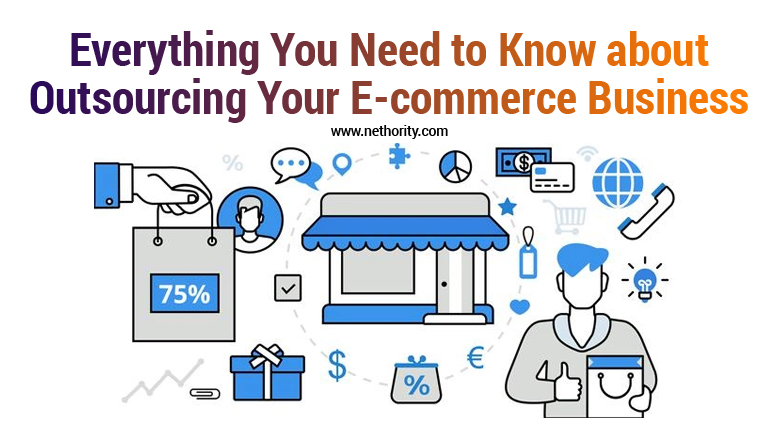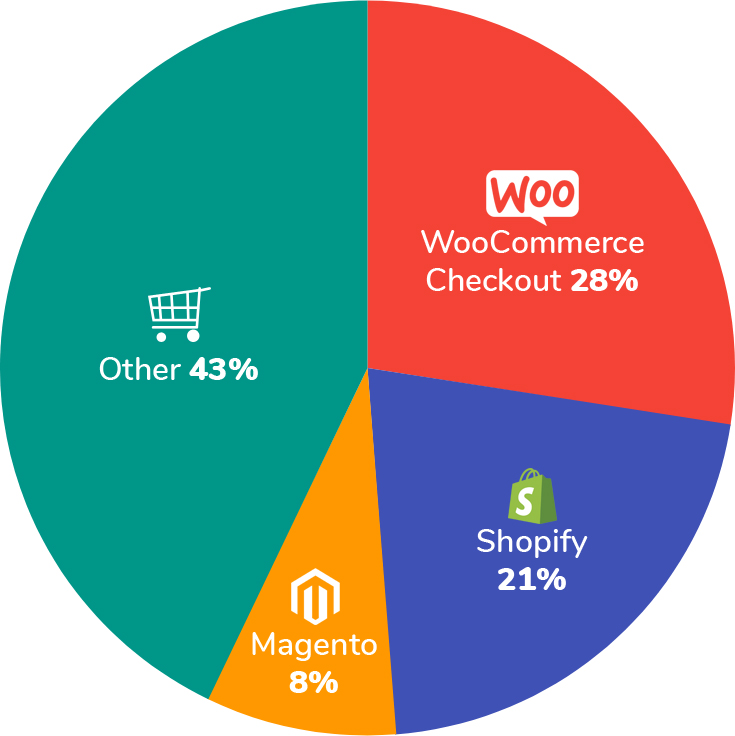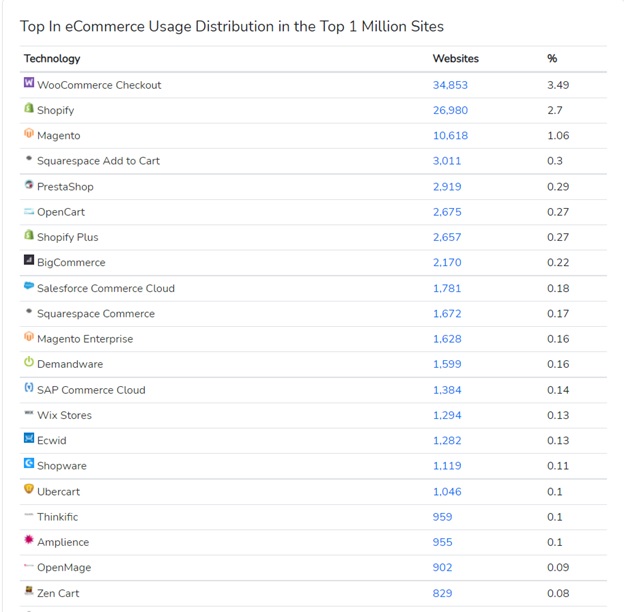Everything You Need to Know about Outsourcing Your E-commerce Business
29th November 2021 / in E-commerce / by Ruturaj Kohok

The pandemic situation brought to light the importance of ecommerce and consumer internet. We are in the middle of massive digital upheaval, with businesses and consumers increasingly relying on internet platforms to gain success for their business. Solopreneurs are setting up internet stores in a matter of hours or days. Brick-and-mortar retailers essentially altered their client base from foot traffic during business hours to worldwide visitation 24 hours a day, seven days a week. Established retailers with significant inventory lowered the time it took to update their product range in half–or more. All while utilizing the greatest ecommerce systems.
Platforms to Choose For Establishing E-commerce Business
1. WooCommerce – Ideal for unlimited product variations and customizable wholesale stores.
2. BigCommerce – Ideal for massive, rapidly shifting inventory.
3. Shopify – Ideal for generating your first million dollars in income.
4. SquareSpace – Ideal for establishing a monopoly in a specific market.
5. Wix– Ideal for stores with fewer than 100 items.
6. Bluehost– Ideal for WordPress users who wish to sell their products online.

Figure 1: source - https://trends.builtwith.com/shop

Figure 2: source - https://trends.builtwith.com/shop
Every company that wants to participate in the e-commerce industry ultimately comes to the point where they must decide whether they should outsource their e-commerce development or maintain it in-house. However, this is not a one-size-fits-all scenario. This is a critical issue that business owners should not take lightly, since picking the appropriate choice is totally reliant on your company’s setup, culture, and long-term ambitions. We are certain that by considering the pros and cons of outsourcing your e-commerce business, we will be able to make your decision a bit simpler.
Pros of Outsourcing E-commerce Development
• A greater degree of expertise
Typically, outsourcing your e-commerce development gives you access to a diverse range of professionals with extensive knowledge in several development sectors. Business executives may relax knowing that their e-commerce growth is in capable hands, removing any concerns or the need for micromanagement. If uncommon problems develop, outsourced professionals can solve them right away, rather than needing to employ another specialist from your in-house staff.
• Greater scalability and adaptability
The advantage of outsourcing remote teams is the total freedom of adaptability that it affords. If you require additional expertise for a single technical job, you may employ them by the hour to do that assignment, rather than paying a full team’s salaries for a few hours’ work.
• Effectively priced
By contracting outsourced teams on an as-needed basis, you can know exactly what you can expect based on the hours invoiced. Essentially, you pay for what you require and reduce duplication. Furthermore, all expenditures connected with full-time personnel are eliminated (time off, sick leave, health and pension fund contributions, etc.)
• Project completion in less time
Dealing with outsourced professionals means that all processes and procedures for creating and managing an e-commerce platform are already in place, saving you important time to focus on entering the market ahead of your competition. Setting up an in-house development team takes a lot of time to hire and build processes, and time is crucial in the e-commerce business when coming to market.
Cons of Outsourcing E-commerce Development
• Communication via the internet
Prior to COVID-19, some company owners believed that having your staff under the same roof directly translated into more production. Some managers believe that if their team is distributed, they will have little control over what happens due to a lack of transparency. To achieve clarity and transparency from your remote workers, it is important to create clear directions for each project early on and set up regular meetings. The world has accepted remote working as an evolution in the way organizations and individuals function as a result of recent advancements in technology such as video calls, emails, and virtual assistants.
• Risks to security
Because outsourced teams are not formally part of the organization, some businesses believe that outsourcing development teams on a project-by-project basis open the door to security leaks and intellectual property (IP) theft. Although genuine, this worry is readily alleviated by requiring non-disclosure agreements (NDAs) and other legal procedures.
Top 7 E-commerce Futuristic Technology Trends
1. Omnichannel approach:
Traditional offline channels are increasingly relying on internet channels to reach their clients. The opposite is also true, as online platforms seek to expand their reach through experiential stores and other means.
2. Multi-language interface:
With Bharat primed to be the next growth engine (tier 2 cities and beyond), it will be critical for e-commerce platforms to deliver their services in a variety of languages to get the necessary momentum.
3. Sales through Direct to consumers (D2C):
With an exponential increase in the number of first-time users going online to satisfy their buying needs, brands and businesses will undoubtedly need to have a presence online, either through marketplace listings or the more profitable D2C channel. The online shopping trend will aid in the growth of specialized product categories and brand reach.
4. Digitization potential for organizations:
The pandemic demonstrated the need for digital ringfence in building a resilient firm. Traditional conglomerates, corporate services, and even small mom-and-pop shops have begun to digitize their operations, and this trend is expected to continue.
5. Adoption of deep technology:
Many e-commerce organizations are implementing deep technology such as Artificial Intelligence, Machine Learning, the Internet of Things, and Virtual Reality to deliver better-tailored services to their consumers.
6. Advent of Super Apps:
Portfolio service options has been expanding as internet enterprises strive to become a one-stop-shop for meeting client demands. While still in its early stages, this is an intriguing trend to keep an eye on.
7. Mergers:
Because the category is still in its developing and exploring stage, there is still great potential to be tapped. Online firms are scrambling to swiftly gain market, wallet, and mind share. Growth in the industry implies that firms are continuously striving to solidify their position and secure long-term and sustainable growth in an increasingly competitive market.
Conclusion
“Start as tiny as you need to while learning the ropes. Even if you’re just selling one hat in one color, at least you’re selling. You’re not going around with a trunk full of unsellable items.” one Shopify user said.
Even if you want to become very large over time, just because it’s simple to get started doesn’t mean you have to go for the fences on day one. Even though “anyone” can create an internet business, the benefits are extremely lucrative. There is game-changing money available. By simply outsourcing your business to specialists, you may make it more robust and multi-dimensional.
If you’re just getting started or want to invest more in setting up your online store, get in touch with Nethority to plan your next step.
Nethority has 8-year long experience in e-commerce business setup and has implemented various strategies that an e-commerce business needs to be successful in today’s highly competitive environment. Whether you are the owner of a Fortune 500 business or company, our e-commerce experts can devise a strong strategy for your e-commerce store that will help you in ranking at the top on search engines. We offer a detailed strategic plan that will help you in targeting the potential audience and achieve futuristic marketing goals.






























